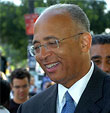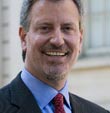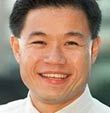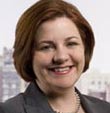★Preferred Candidate★

William Thompson – Dem
Education: Tufts University (degree not reported)
Campaign Website
Campaign Finance Filings
Campaign Website
Campaign Finance Filings
Bill Thompson was the Democratic primary nominee for mayor in 2009. He served for city comptroller for eight years prior to running for mayor and previously, as president of the New York City Board of Education and as deputy borough president. Among reform issues, Thompson supports independent budgeting for offices that check the mayor’s power like the borough presidents, public advocate and community boards. He also supports many campaign and election reforms proposed by CU and is open to creating greater oversight of the police as proposed by CU. Beyond reform, Thompson’s top priorities are public safety, education and the city’s finances. He had the clearest and most practical set of ideas of what he focus on and how he would seek to accomplish during the first days of his administration. On public safety, Thompson believes ensuring the crime rate stays low is the foundation for all other progress. He proposes reforming the practice of stop and frisk by requiring police officers provide a ticket to suspects explaining why they are being stopped and by leading as mayor, can eliminate the perception of or actual quotas for stops. Thompson also supports hiring additional police officers. On education, Thompson touted his service as President of the Board of Education during which he centralized authority and laid the groundwork for mayoral control. He supports efforts to standardize curriculum through the Common Core initiative, and laments the overemphasis on test scores at the expense of subject content. He supports charter schools and praised the district structure as facilitating parental engagement. Thompson believes he can establish a collaborative tone with stakeholders in education and has a history of working with the UFT to accomplish goals. Regarding the city’s finances, Thompson would only raise taxes as a last resort, and acknowledges the fiscal challenges posed by pensions and health benefits for city employees. Upon taking office, he would scrutinize city agency spending with his staff and in-source certain consultant contracts to control spending. Citizens Union believes Thompson is well prepared to be Mayor of the City of New York given his array and breadth of experience. He has managed large offices and brings both public and private sector executive experience. While he should have done more to prevent the CityTime scandal as comptroller, he restored integrity to an office that had been plagued by the corrupt practices of his predecessor. His understanding of and relationships in education are critical to making improvements to our educational system, an important objective with school spending comprising nearly a third of the city’s budget. He will bring a pragmatic and focused approach to governing which holds appeal. He possesses the right temperament to build consensus with the business community, advocates, labor, and other stakeholders to forge common ground in addressing issues, much like he did when he led the effort to centralize the city’s education system. Citizens Union believes Thompson is trustworthy, consistent, and reliable. He possesses the character, competence, and capability to lead the city as its next mayor, which is why Citizens Union prefers him in the Democratic primary over other well-qualified candidates.

Bill de Blasio – Dem
Age: 52
Occupation: Public Advocate
Education: New York University (BA); Columbia University (MA)
Campaign Website
Candidate Questionnaire
Campaign Finance Filings
Occupation: Public Advocate
Education: New York University (BA); Columbia University (MA)
Campaign Website
Candidate Questionnaire
Campaign Finance Filings
Bill de Blasio is currently the city’s public advocate, and served in the City Council prior to taking the office. When de Blasio ran for the post, he earned CU’s support. He has served as Hilary Clinton’s campaign manager in her 2000 race against Rick Lazio and, before that, as Regional Director for the U.S Housing and Urban Development agency. He gained experience in the mayor’s office as an aide to former Mayor David Dinkins. On reform issues, de Blasio touted his work as public advocate in response to the controversial Citizens United decision. He organized the largest response ever to a Securities and Exchange Commission (SEC) rule change related to the decision and acted locally to support transparency of campaign spending through the New York City Campaign Finance Board and New York State Attorney General’s Office. De Blasio sees transparency as potentially transformative for good government, pointing to his public list of landlords who did not fix violations in their buildings as an example of the power of transparency. DeBlasio supports reforming the board of elections and campaign finance reform at the state level, and will lobby Albany on both along with early voting and vote by mail. Beyond reform, de Blasio’s overarching focus of his campaign is addressing income inequality from which many of his policies flow. He touts his common man credentials, noting that he is a homeowner from an outer borough with children in the public schools. His signature policy is taxing the wealthy to pay for universal pre-kindergarten, putting in place a 5-year temporary tax on income earners of $500,000 or greater of 4.3 percent up from the current 3.9 percent. He wants to create more affordable housing by mandating inclusionary zoning. He supports a more robust version of paid sick leave. De Blasio also backs mayoral control of schools and greater parental engagement. He separates himself from the other Democratic candidates on stop and frisk, noting he is only candidate who will replace Commissioner Kelly, supports legislation for both an inspector general for the NYPD and expanding access to the courts for racial profiling claims. He would continue Bloomberg’s health and climate change initiatives. De Blasio’s pointed to his experience in the federal government and as campaign manager for Hilary Clinton as preparing him for the management and visibility of the mayoralty. Citizens Union respects de Blasio’s candidacy and believes that he is arguably the most eloquent of the candidates in conveying a vision of what he will tackle as mayor. We have no doubt that de Blasio as mayor would be dedicated to a transparent administration engaging all stakeholders and residents in the solutions he seeks. His focus on income inequality is admirable but we believe it could be presented in a manner that is more inclusive and unifying for the city. Citizens Union appreciates de Blasio’s advocacy for reform issues and his coherent vision for the city, yet his record of accomplishments in public office, most notably as public advocate is not as substantial as it could have been, in part owing to the limited power of the office, but also on what he chose to focus on.

John C. Liu – Dem
Candidate Questionnaire
Age: 46
Age: 46
Occupation: New York City Comptroller
Education: SUNY Binghamton (BA)
Campaign Website
Campaign Finance Filings
Campaign Website
Campaign Finance Filings
John Liu is currently the city’s comptroller. Citizens Union supported his election in 2009. He served in the City Council prior to becoming comptroller. He also has private sector experience working in finance as an actuary. On reform issues, Liu has worked to make more transparent city contracts and the Economic Development Corporation. He touted his plans to consolidate the pension boards which he believes would generate $1 billion annually and noted his accomplishments in shedding light on city subcontracting, city expenditures, and pension board meetings and decision-making. He supports performance-based reporting by the City Board of Elections. In addition to reform issues, Liu’s priorities are public safety, education, and housing. Liu believes schools are not corporations and should not be run as such. He would therefore appoint a chancellor with an educational background. He wants to restore a school learning environment that is less focused on reporting data. Despite this reorientation, Liu still backs mayoral control albeit he would require fixed terms for the Panel on Education Policy and alter the appointing authorities. He believes charter schools should pay rent and get approval from the community for co-location. He backs expanded pre-school programs and universal pre-kindergarten. On public safety, Liu would replace Ray Kelly, end stop, question and frisk altogether and focus on community policing. Regarding housing, Liu supports mandatory inclusionary zoning, and opposes the in-fill plan for NYCHA housing. Citizens Union believes Liu possesses management experience for the mayoralty, having run the 700-person comptroller’s office along and work as an actuary. He can point to significant accomplishments in modernizing the comptroller’s office and making it and city spending more transparent. Yet despite his passionate defense of his campaign management, Liu’s credibility has been affected though after a years-long effort to find serious wrong-doing with only two people to date associated with his campaign having been found guilty of illegal campaign practices. Citizens Union respects the good work Liu has done as comptroller and his admirable zeal to include the underrepresented, but believes his solutions to the very real issues facing New York do not speak to all the important stakeholders whose support will be needed to enact the changes he proposes.

Christine C. Quinn – Dem
Age: 47
Occupation: Speaker, City Council of New York
Education: Trinity College (BA)
Campaign Website
Campaign Finance Filings
Occupation: Speaker, City Council of New York
Education: Trinity College (BA)
Campaign Website
Campaign Finance Filings
Christine Quinn is currently the Speaker of the City Council. She has been in office for 14 years, 8 as speaker. Quinn has the longest record on Citizens Union’s reform agenda, for both better and worse. As speaker, she has played a major role in strengthening campaign finance laws, making lobbying activity more transparent, providing oversight of election administration and improving transparency of Council proceedings and enhancing access to city data. If elected mayor, Quinn promises to continue to advocate for all the Council’s proposals made before the 2010 charter revision commission which importantly create greater transparency of the city’s budget and provide a more meaningful role in negotiations for the City Council. Quinn, however, also acted to overturn term limits despite two public referenda in support and Citizens Union believes has unfairly at times wielded discretionary funding as a tool to bring independent-acting lawmakers into the fold. Quinn disputes the latter, stating for example that she cut Peter Vallone Jr.’s discretionary funding because his district was overcompensated from the period when his father was speaker. Beyond reform issues, Quinn’s top priorities for the city are housing, education and jobs. On housing, Quinn wants to improve the current housing stock by allocating $300 million to build 40,000 units of affordable housing. She touts her record passing a law giving tenants the right to sue for harassment if housing violations persist. On education, Quinn would create a Deputy Mayor for Education and Children to ensure a more comprehensive approach to serving children. She backs a longer school day and public-private partnerships to facilitate after-school services. She would reform school accountability by making school progress reports less focused on test results. Quinn opposes the network structure and would bring back a regional structure for administering schools. She supports charter schools. On jobs, she wants to provide a bridge to skilled jobs through CUNY and other training programs, pointing to her work creating adult computer coding programs and a technology apprenticeship program. Quinn doesn’t want to raise taxes but would rather raise income than property taxes if necessary. She would like to end the requirement that low-income residents pay income taxes if they also receive the earned income tax credit. Quinn believes her experience running the Council prepares her to run the city, citing her negotiation skills in which she saved 4,100 jobs in education while acquiring union givebacks as part of the budget. She believes managing the Council is the equivalent of managing an agency only made more challenging by overseeing members who are not her employees. Citizens Union admires Speaker Quinn’s overall record of significant accomplishment as a result of working collaboratively with the mayor to get things done that provides her with the knowledge and know-how for the office. Perhaps the greatest complement that can be paid to Quinn is that the Council has transcended beyond its traditional role as foil to the executive under her leadership, and played a meaningful role in governance of the city during her tenure. Yet her role in extending term limits and overturning the will of the voters and stalling action on important issues before the council that commanded strong support gave us just enough pause not to back her given the record and appeal of another candidate in the race who we support. While she is certainly a worthy and well-qualified candidate for mayor, she falls just short of earning our preference for these reasons.
